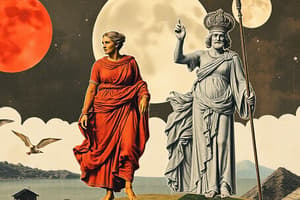Podcast
Questions and Answers
What is the primary purpose of the stories in Greek mythology?
What is the primary purpose of the stories in Greek mythology?
- To document Greek religious practices
- To serve as a genealogical record of the gods
- To recount historical events in detail
- To provide moral guidance and explain natural phenomena (correct)
Which work is primarily concerned with the theme of the Trojan War?
Which work is primarily concerned with the theme of the Trojan War?
- Odyssey
- Divine Comedy
- Iliad (correct)
- Theogony
Who led the Olympians in their battle against the Titans?
Who led the Olympians in their battle against the Titans?
- Hesiod
- Cronus
- Zeus (correct)
- Uranus
What is the significance of Mount Olympus in Greek mythology?
What is the significance of Mount Olympus in Greek mythology?
Which pair of figures are recognized as the parents of the Titans?
Which pair of figures are recognized as the parents of the Titans?
Which god is known as the ruler of all divinities on Mount Olympus?
Which god is known as the ruler of all divinities on Mount Olympus?
Who is considered the goddess of love and beauty?
Who is considered the goddess of love and beauty?
Which of the following gods is associated with the sea and earthquakes?
Which of the following gods is associated with the sea and earthquakes?
Which goddess is known for her wisdom and also for being a war deity?
Which goddess is known for her wisdom and also for being a war deity?
What is the role of the Furies in Greek mythology?
What is the role of the Furies in Greek mythology?
Who is the messenger of the Olympian gods?
Who is the messenger of the Olympian gods?
What theme in Greek mythology often leads to tragic outcomes through failed attempts at defiance?
What theme in Greek mythology often leads to tragic outcomes through failed attempts at defiance?
Which goddess is known as the goddess of the hearth?
Which goddess is known as the goddess of the hearth?
What do the Muses represent in Greek mythology?
What do the Muses represent in Greek mythology?
Who is recognized as the god of wine in Greek mythology?
Who is recognized as the god of wine in Greek mythology?
Flashcards are hidden until you start studying
Study Notes
Overview of Greek Mythology
- Composed of stories about gods and goddesses, not a literal account of Greek religion.
- Serves as an explanation of existence and teaches moral lessons about human responsibilities.
- Explores themes of love, hate, emotions, family dynamics, and conflicts.
- Functioned as entertainment among ancient Greeks.
Basis of Classical Greek Mythology
- Theogony by Hesiod: Addresses the origins of the gods.
- Iliad by Homer: Focuses on the events of the Trojan War.
- Odyssey by Homer: Chronicles a long journey, highlighting heroic adventures.
Greek Divinities
-
Titans:
- Earliest group of gods, led by Cronus.
- Parents: Gaia (Earth) and Uranus (Sky).
- Initially resided in Tartarus after being overthrown.
-
Olympians:
- Dominant group led by Zeus, who is also the god of the sky and thunder.
- Parents: Cronus and Rhea.
- Reside on Mount Olympus and overthrew the Titans.
-
Key Olympians:
- Zeus: Ruler of Mount Olympus, notorious for his numerous affairs.
- Poseidon: God of the sea and earthquakes; Zeus's brother.
- Hades: God of the underworld; also Zeus's brother.
- Apollo: God of the sun, music, and poetry; son of Zeus and Leto.
- Ares: God of war.
- Hephaestus: God of fire and blacksmith for the gods; son of Zeus and Hera.
- Hermes: God of commerce and thieves; messenger of the Olympians; son of Zeus and Maia.
- Hestia: Goddess of the hearth; Zeus's sister.
- Hera: Goddess of marriage; sister and wife of Zeus.
- Athena: Goddess of wisdom and war; daughter of Zeus.
- Aphrodite: Goddess of love and beauty; born from sea foam or daughter of Zeus and Dione.
- Artemis: Goddess of the hunt and moon; Apollo's twin sister.
Minor Divinities
- Eros: God of love; known as Cupid in Latin.
- Dionysus: God of wine; son of Zeus and Semele.
- Nymphs: Nature guardians, depicted as beautiful maidens.
- Fates: Three goddesses controlling human destiny.
- Furies: Sisters who punish evildoers after death (Tisiphone, Megaera, Alecto).
- Muses: Nine daughters of Zeus and Mnemosyne, each representing different arts and sciences.
Featured Characters
- Demigods: Part divine, part mortal beings; example: Heracles symbolizing strength.
- Heroes: Mostly mortal figures often descended from gods.
- Monsters: Symbolic creatures that depict challenges.
Literary Forms
- Epic: Narratives centered on heroes' adventures.
- Lyric Poems: Short poems typically sung, often at weddings.
Common Elements and Themes in Greek Mythology
- Setting: Primarily ancient Greece, with other mythical locations like Mount Olympus and the underworld.
- Characters: Involves gods, heroes, and mythical beings with clearly defined roles of good (protagonist) and evil (antagonist).
- Plot Structure: Typically follows a clear arc: exposition, rising action, climax, falling action, and resolution.
- Themes: Universal ideas such as fate, revenge, and moral consequences.
Key Themes in Greek Mythology
- Fate: Attempts to alter destiny often lead to its fulfillment; prophecies are inescapable.
- Reward and Punishment: Gods reward or punish mortals according to their actions, especially regarding pride and disobedience.
- Love: Commonly depicted as tragic and often unrequited, particularly in relationships between gods and mortals.
- War: Seen as an inevitable honor, with gods often taking sides in human conflicts.
- Vengeance: Recurrent theme in myths where characters seek revenge, perpetuating cycles of bloodshed.
- Beauty: Emphasized as a valuable trait, correlating beauty with worth.
Studying That Suits You
Use AI to generate personalized quizzes and flashcards to suit your learning preferences.




